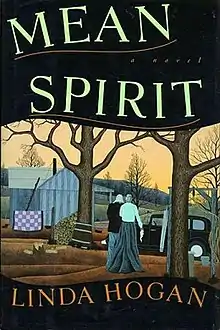Mean Spirit
Mean Spirit is a book about the Osage tribe during the Oklahoma oil boom. It is the first novel by Chickasaw author Linda Hogan. It was nominated for the Pulitzer Prize for Fiction in 1991.
 First edition | |
| Author | Linda Hogan |
|---|---|
| Original title | Mean Spirit |
| Language | English |
| Published | Atheneum Books, 1990 |
| Media type | |
| Awards | Selected by the Literary Guild |
| ISBN | 0804108633 |
Synopsis
The book is set in the 1920s, at a time when rivers of oil were discovered underneath land in Oklahoma that had been purchased by the Osage Tribe after displacement. As a result of mineral leases, Grace Blanket became the wealthiest individual in the territory. She is murdered by unknown suspects. The Graycloud family takes over the care of her daughter and heir Nola Blanket. One-by-one, members of the Graycloud family suffer suspicious deaths, and no-one knew why. Local authorities show no interest in Native deaths. Letters begging for help to Washington DC. Stace Red Hawk, a Native American government official, decides to investigate: he finds intimidation, fraud, and murder and then something else quite by surprise—that he had a true love for his people along with their brave past.
Plot
Mean Spirit is a murder mystery set during an era known as the Osage murders, in Osage Indian Territory in Oklahoma in the 1920s.[1]
The novel begins with the murder of Grace Blanket and the cover-up of what happened. Grace's daughter, Nola, is now in danger because she was a witness and because she inherits all of her mother's oil-rich land. She is forced to move in with her cousins, the Greyclouds, for protection. Nola soon becomes eligible to marry, but marriage is dangerous as White men view marriage to a Native women with oil land as a business investment and deal. As other Osage continue dying under suspicious circumstances, the evidence suggests that rancher turned oilman, John Hale, is behind the murderous actions. No legal actions are taken until Stace Red Hawk, a "Lakota Sioux working for the U.S. Bureau of Investigation" decides comes to Oklahoma from DC in search of the truth. As the battles between the two worlds mount, Nola and others break away from the greed and start to rediscover their relationship with the land.[2]
Reception
Mean Spirit was selected by the Literary Guild as being "extraordinary...If you take up no other novel this year, or next, this one will suffice to hold, to disturb, to enlighten and to inspire you."[3]
It was nominated for the Pulitzer Prize for Fiction in 1991.[4]
Barbara Kingsolver in the LA Times found it "relentlessly sad" yet full of realistic, complex characters; she praised Hogan: "She's created empathy. She carves a vast tragedy down to a size and shape that will fit into a human heart."[5]
References
- https://www.simonandschuster.com/books/MEAN-SPIRIT/Linda-Hogan/9781501112454
- https://www.washingtonpost.com/archive/lifestyle/1990/12/06/book-world/ca10e56a-3828-45ae-8a94-ecef523d12fe/
- Hogan, Linda (1990). Mean Spirit. Ivy Books. ISBN 9780804108638.
- "The Pulitzer Prizes: Fiction". Pulitzer. Retrieved 4 September 2014.
- Kingsolver, Barbara (November 4, 1990). "Worlds in Collision : MEAN SPIRIT By Linda Hogan". LA Times. Retrieved 11 June 2015.
Sources
- Symington, Justin. "Mean Spirit". Religioius Studies in Secondary Schools. Retrieved 4 September 2014.
- Casteel, Alix (1994). "Dark Wealth in Linda Hogan's Mean Spirit". Studies in American Indian Literatures. University of Nebraska Press. 6 (3): 49–68. JSTOR 20736796.
- Warrior, Robert Allen, and Dennis Mcauliffe. Vol. 11, no. 1, 1995, pp. 52–55., doi:10.2307/1409043. Accessed 10 May 2019.